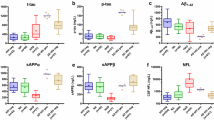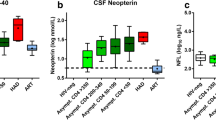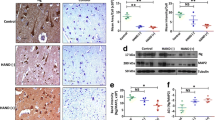Abstract.
Background:
The involvement of the central nervous system (CNS) is a prominent feature of infection with human immunodeficiency virus type-1 (HIV-1). One of the neuropathological hallmarks of HIV-1-associated dementia (HAD) is the proliferation of astrocytes (astrogliosis). The major structural protein of astrocytes is glial fibrillary acidic protein (GFAP) and its increased expression has been reported in disorders characterized by astrogliosis.
Patients and Methods:
In order to determine whether CSF GFAP may be a putative marker for HAD, we measured CSF GFAP levels of HIV-infected patients with (n = 11) and without (n = 21) HAD, and, additionally, of HIV-infected patients with opportunistic CNS diseases (n = 13) and HIVnegative control patients (n = 20) using an immunoflourescent sandwich immunoassay.
Results:
CSF GFAP levels and the frequency of increased GFAP levels did not significantly differ between the three groups of HIV-infected patients.
Conclusion:
Our data suggest that CSF GFAP is not a sensitive laboratory marker for HAD.
Similar content being viewed by others
Author information
Authors and Affiliations
Corresponding author
Rights and permissions
About this article
Cite this article
Sporer, B., Missler, U., Magerkurth, O. et al. Evaluation of CSF Glial Fibrillary Acidic Protein (GFAP) as a Putative Marker for HIV-Associated Dementia. Infection 32, 20–23 (2004). https://doi.org/10.1007/s15010-004-3048-6
Received:
Accepted:
Issue Date:
DOI: https://doi.org/10.1007/s15010-004-3048-6




